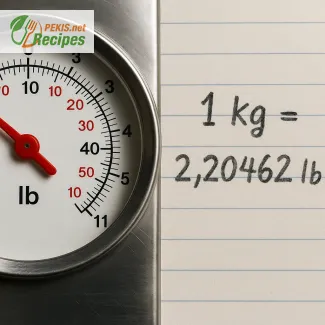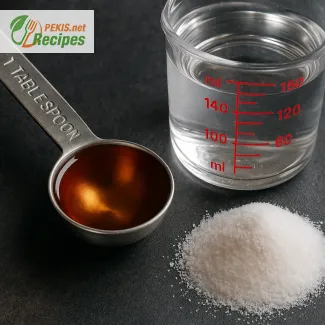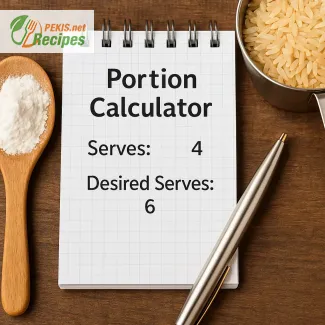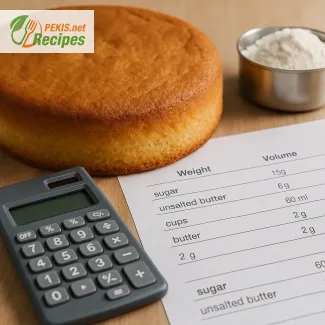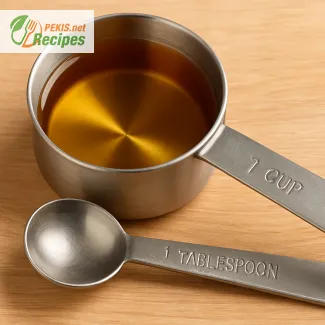
Converting 45 ml to tablespoons equals about 3 tbsp in both US and UK standards, with only minor variations between 14.8 ml and 15 ml. This conversion is essential for maintaining accuracy in recipes, ensuring consistent flavors and textures. Knowing the equivalence simplifies measuring liquids like oil, vinegar, milk, or syrups, especially when switching between metric and spoon-based systems. With quick reference points such as 15 ml = 1 tbsp and 30 ml = 2 tbsp, it becomes effortless to remember that 45 ml equals 3 tablespoons in most cooking scenarios.
Converting 45 ml into tablespoons with simple steps
Understanding tablespoon conversions in everyday cooking
When measuring liquids or semi-liquids in the kitchen, knowing how to convert 45 ml to tablespoons is a practical skill that saves time and ensures accuracy. In most cooking traditions, spoons are used as a quick way to portion sauces, oils, vinegars, or syrups. Since recipes often switch between milliliters (ml) and tablespoons (tbsp), mastering these conversions helps avoid mistakes that could change the taste, texture, or consistency of food.
The concept of tablespoons as a unit dates back to household cooking in Europe and the US, where spoons were commonly used to standardize amounts before precise measuring tools became widespread. Over time, standardization led to slight variations: in the US a tablespoon equals about 14.8 ml, while in the UK and parts of the Commonwealth, it often equals 15 ml. Understanding these small differences is key when following recipes from different regions.
Why accurate ml to tbsp conversion matters
- Consistency in recipes – exact measurements guarantee the same results each time.
- Balanced flavors – too much or too little liquid can overpower or weaken taste.
- Texture control – especially important in sauces, custards, and dressings.
- Efficiency – quick mental math saves effort when scaling recipes.
Why you will enjoy this guide
- Clear explanation of 45 ml to tablespoons in both US and UK systems.
- Easy-to-follow comparison with practical examples.
- Focus on real kitchen scenarios instead of abstract math.
- Helps bridge international recipe differences.
- Practical and concise format you can return to quickly.
Comparative breakdown of 45 ml
- US measurement: 45 ml ÷ 14.8 ml ≈ 3 tablespoons
- UK/metric measurement: 45 ml ÷ 15 ml = 3 tablespoons
- Rounded practical use: in most recipes, 45 ml equals 3 tablespoons regardless of system.
How ingredient type affects tablespoon use
Different ingredients behave differently when measured in tablespoons. Liquids like water, oil, or vinegar fill a spoon uniformly, while thicker substances such as honey, syrups, or peanut butter may stick, causing slight variations. Powders like cocoa or flour can pack tightly or loosely depending on scooping technique. This is why knowing both ml and tbsp equivalents is important when experimenting with textures or substituting ingredients.
Common contexts where 45 ml appears
- A small portion of olive oil for dressing salads.
- A measured amount of soy sauce for marinades.
- Sweeteners such as maple syrup or honey in desserts.
- Liquids in baking like milk or cream for moistness.
- Cocktail recipes that often balance spirits and mixers in tablespoons.
Practical tips for using tablespoons
- Always level off dry ingredients for precision.
- Warm sticky liquids (like honey) slightly to make spooning easier.
- For repeat recipes, consider noting both ml and tbsp to avoid confusion.
- Remember that different countries may have slightly different tablespoon volumes.
Related entities and conversions
Volume measurement standards across regions
- Milliliter (ml) – metric base for liquids, universally applied.
- Tablespoon (tbsp) – varies slightly between US (14.8 ml) and metric/UK (15 ml).
- Teaspoon (tsp) – 5 ml in metric standard, 4.93 ml in US standard.
Quick comparison examples
- 15 ml = 1 tablespoon
- 30 ml = 2 tablespoons
- 45 ml = 3 tablespoons
- 60 ml = 4 tablespoons
By keeping these reference points in mind, converting measurements like 45 ml to tbsp becomes a natural part of your cooking routine. This creates more reliable results and reduces errors when working across different recipe sources.
FAQ questionHow many tablespoons is 45 ml?
45 ml is essentially 3 tbsp. In the US, 1 tbsp ≈ 14.79 ml, so 45 ÷ 14.79 ≈ 3.04 tbsp (a hair over three). In the metric/UK standard, 1 tbsp = 15 ml, so 45 ÷ 15 = 3 tbsp exactly. For most kitchen tasks, round to 3 tablespoons.
FAQ questionIs it the same in US and UK recipes?
Almost. A US tablespoon is ~14.79 ml; a metric tablespoon is 15 ml. If a recipe specifies 45 ml and you only have US spoons, measure 3 tbsp + about ⅛ tsp to match 45 ml precisely. If a recipe says 3 tbsp and you’re using metric, that’s 45 ml on the nose.
FAQ questionHow many teaspoons is 45 ml?
Since 1 tbsp = 3 tsp, 45 ml equals 3 tbsp = 9 tsp. Using metric teaspoons (5 ml each): 45 ÷ 5 = 9 teaspoons. This is a reliable fallback when tablespoons aren’t available.
FAQ questionWhat is 45 ml in fluid ounces and cups?
In US fluid ounces, 45 ml ≈ 1.52 fl oz. In US cups (240 ml), 45 ml ≈ 0.19 cup. In metric cups (250 ml), that’s about 0.18 cup. These are handy for scaling marinades, dressings, and batters.
FAQ questionDoes ingredient type change the 45 ml → tbsp conversion?
The volume stays the same, but measurement error can creep in. Sticky ingredients (honey, syrup) cling to the spoon—lightly oil the spoon for a cleaner 45 ml measure. Thick liquids (yogurt, tahini) should be leveled; powders (cocoa, flour) can compact, so avoid heaping. The conversion remains 45 ml ≈ 3 tbsp; technique ensures accuracy.
FAQ questionHow can I measure 45 ml without a tablespoon?
Use what you have:
- Teaspoons: measure 9 tsp.
- Jigger/shot: a US jigger is 1.5 fl oz (~44.36 ml)—fill it and add ~⅛ tsp.
- Medicine cup or measuring jug with ml markings: pour to 45 ml.
- In a pinch, combine smaller measures (e.g., 2 tbsp + 1 tbsp or 6 tsp + 3 tsp) to reach 45 ml.
PEKIS – a professional chef and recipe developer with over 25 years of experience, specialized in European and international cuisine. My long practice with everyday kitchen conversions, like turning 45 ml into tablespoons, comes from testing recipes across different regions where metric and spoon systems overlap, ensuring both precision and real-world usability.
